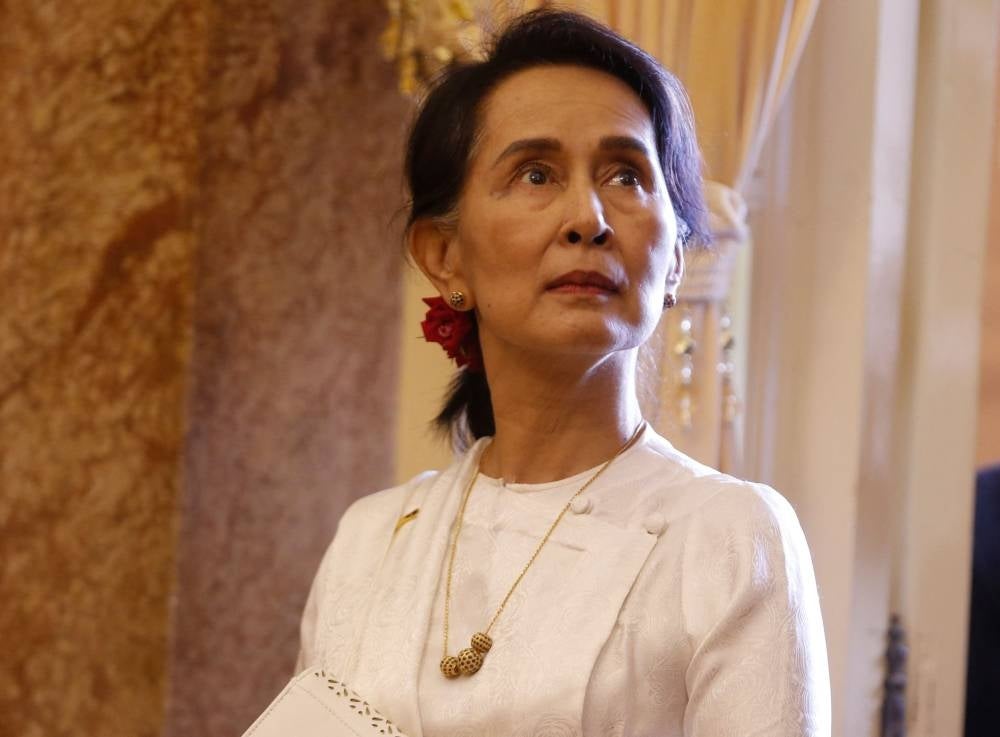Myanmar junta cuts six years from Suu Kyi's 33-year jail term

YANGON, Myanmar - Myanmar reduced ousted civilian leader Aung San Suu Kyi's 33-year prison sentence by six years in a partial pardon on Tuesday, as the junta struggles to quell bloody resistance to its rule. The country has been ravaged by violence in the two years since Suu Kyi was deposed in a coup and hit with 19 criminal cases ranging from corruption to breaching Covid-19 rules.
There have been concerns for the 78-year-old Nobel laureate's health and the junta moved her from prison to a government building last week.
"Six years imprisonment will be reduced," junta spokesman Zaw Min Tun told reporters after it was announced she had been pardoned in five cases.
Suu Kyi still faces 14 cases despite the pardon. Rights groups have condemned the legal battle against her as a sham designed to remove a popular democratic leader from the public eye.
Former Myanmar president Win Myint, who was also removed in the 2021 coup, was granted a four-year reduction in relation to two cases, the junta spokesman said. - 'Cruel games'.
Tuesday's announcement was part of an amnesty of more than 7,000 prisoners to mark Buddhist Lent, including 125 foreigners who are to be released and pardoned.
An unspecified number of prisoners facing the death penalty also had their sentences commuted to life imprisonment, the announcement said.
David Mathieson, an independent analyst on Myanmar, said the partial pardon was a "cynical ploy to tell the world that there might be some kind of political resolution coming. When we know that there is not".
"I think they are just playing cruel games with a political prisoner," Mathieson told AFP.
"All the charges against her are absurd and shaving six years off 33 isn't mercy."
Human Rights Watch's Asia division deputy director Phil Robertson said the junta aimed "to create the impression of moderation and dialogue when in fact there really is none on offer".
Joe Freeman, a spokesman on Myanmar for Amnesty International, said the reductions showed the arbitrary nature of the junta's military courts.
"Those swept up in its clutches never know what may happen to them," he told AFP.
- Still popular -
Suu Kyi was detained on the night of the coup in February 2021 and has only been seen once since -- in grainy state media photos from a bare courtroom in the military-built capital Naypyidaw.
She was required to attend almost daily hearings in the junta court to hear cases against her ranging from corruption to possession of illegal walkie-talkies and flouting coronavirus restrictions.
In July, Thailand's foreign minister met Suu Kyi, the first known meeting with a foreign envoy since she was detained. Details of what they discussed are not known.
Suu Kyi remains popular in Myanmar, even after her international image was tainted by a power-sharing deal with the generals and her failure to speak up for the persecuted Rohingya minority.
But many of those fighting for democracy since the coup have abandoned her principle of non-violence and taken up arms to try and permanently root out military dominance of Myanmar's politics and economy.
As a result, much of the Southeast Asian country is in armed conflict, with thousands killed since the coup, more than a million displaced according to the United Nations, and the army struggling to assert its dominance.
According to a local monitoring group, more than 3,800 people have been killed since the coup, a figure the junta puts at 5,000.
The junta announced on Monday it would extend a state of emergency by six months, which is likely to delay elections promised for August.
The military cited alleged widespread voter fraud during November 2020 elections as a reason for its coup, which sparked huge protests and a bloody crackdown.
Those polls, won resoundingly by Suu Kyi's National League for Democracy, were described as free and fair by international observers.
Myanmar regularly grants amnesties to thousands of prisoners to commemorate holidays or special Buddhist dates.
The junta released some 23,000 prisoners after the 2021 coup, although rights groups feared it was an attempt to free up space for military opponents.
More than 24,000 people have been arrested since the military's coup, according to a local monitoring group, and almost 20,000 remain behind bars. - AFP









